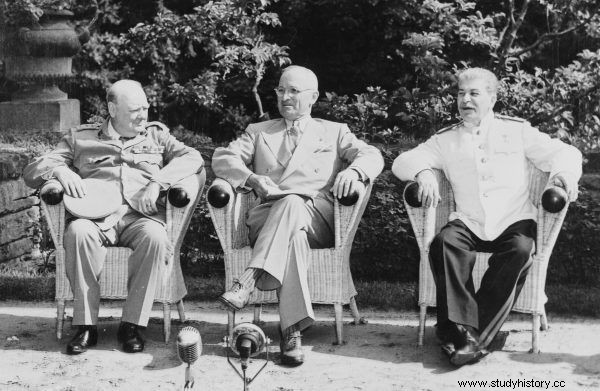It was enough for the Second World War to end, and the Western allies forgot overnight about Polish allies and our contribution to the victory over Nazi Germany. As always in such cases, the cold political calculation won. It was on its basis that the leaders of Great Britain and the United States did everything they could to take Wrocław, Szczecin and the entire Western Territories from Poland.
The reasoning of Western politicians was simple:if the Republic of Poland fell - with their consent - into the snares of the Soviet Union, it should be weakened as much as possible. The Soviet satellite with wide access to the sea and the whole of Silesia seemed to be a worse solution than a hulled state without at the same time eastern lands and any compensation in the west.
In short, the British and Americans wrote us off. However, they still had serious hopes for Germany - especially when the specter of the Cold War loomed on the horizon.
As early as at the Potsdam Conference in July 1945, Winston Churchill - this (as the textbooks teach) a great friend of Poles - insisted on not handing over German cities to Poland. He argued that the British would be "shocked" by such huge population movements. Besides, the UK Prime Minister insisted that he was also defending our interests: Compensation should correspond to the loss, however. It will not do Poland any good to conquer such a large amount of additional territory.

Churchill, Truman and Stalin at the Potsdam Conference. Of the three, only the Soviet leader wanted to hand over the Western Territories to Poland (source:U.S. National Archives and Records Administration, public domain).
Fortunately for Poland, a few days later, due to the announcement of the results of his losing elections, Churchill left Potsdam. However, the plans to deprive Poland of new territorial acquisitions did not go away with him. Although the Soviet side pushed through the border line along the Odra and Nysa Łużycka rivers, the great game was just beginning.
Churchill continued to thunder that the Russian-dominated Polish government had been encouraged to carry out enormous and harmful annexations at the expense of Germany. James Byrnes, the American secretary of state in Harry Truman's office, who visited Stuttgart in September 1946, spoke out loudly against the consolidation of the Polish western border.
A year later, the strict American project was prepared by his successor, George Marshall, known for his plan to rebuild Europe. According to Marshall's proposal to the Soviet Union, Poland would give Germany all of Lower Silesia, the Lubusz Land and Western Pomerania, all the way to Kołobrzeg.
The borders in the south were to end in Upper Silesia , so proceed in a similar way as before the war (we have marked more or less part of the territory of the Republic of Poland on the map above). Another variant assumed the internationalization of Silesia.

The matter became even more pressing when the western part of Germany regained its independence as the Federal Republic of Germany. The new chancellor, Konrad Adenauer, stated in 1951 in the Bundestag: I want to make it clear that for us the lands on the other side of the Oder and Neisse are parts of Germany. The revindication of the western provinces of Poland was to be the first step after the reunification of West Germany and the GDR .
Although the United Kingdom and the United States did not officially subscribe to such an action plan, they took it into account unofficially. Andrzej Leon Sowa writes in his new book - 'The Political History of Poland 1944-1991' - that in September 1953 Great Britain prepared a secret project depriving Poland of its territory between Nysa Kłodzka and Łużycka in the event of signing a peace treaty between the four powers and reunified Germany.
How about all of Moscow?
You can say anything about Stalin, but certainly not that he was a friend of the Poles. However, it was his attitude that guaranteed Poland today's territory.

Poles in Szczecin in 1945. Their presence was definitely not convenient for the Allies…
Of course, the leader of the USSR did not oppose the plans of the Allies out of sheer goodness of heart:he absolutely included the dedication of Poland's western lands to Germany, but on the condition of the reunification of West Germany and the GDR within one communist-dominated state. Fortunately for Poland, Germany was indeed united, but only 40 years later, under completely different political conditions.
The Soviet Union itself, in turn, took 20 years to make sure that playing the Recovered Territories card did not allow it to gain control over all of Germany. Finally, in 1965, the Soviet government guaranteed Poland the inviolability of its western border. The government of the Federal Republic of Germany did the same, but only in 1970 - 25 years after the end of the war. As part of the famous December agreement between Germany and the People's Republic of Poland, Germany finally gave up Silesia and Western Pomerania.
Sources:
Basic:
- Andrzej Leon Sowa, The Political History of Poland 1944-1991, Wydawnictwo Literackie 2011.
Complementary:
- Frederick Taylor, Exorcizing Hitler:The Occupation and Denazification of Germany , Bloomsbury Press 2011.
